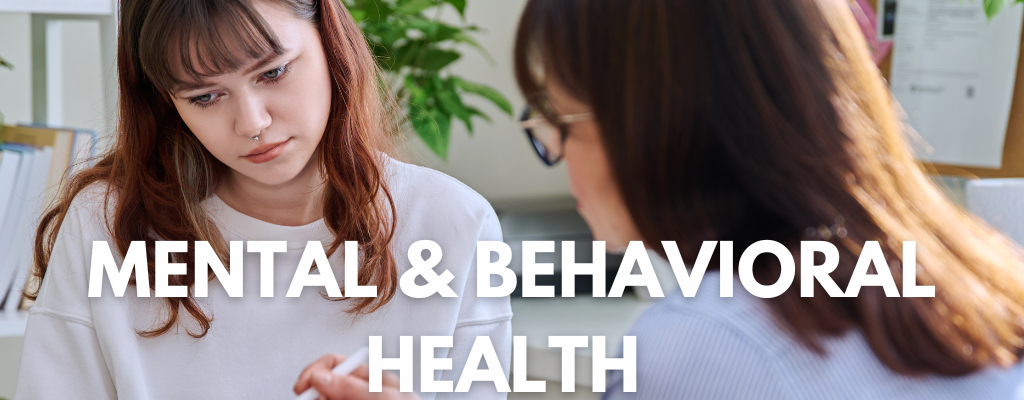
Mental and Behavioral Health Counseling: An Overview
Mental and behavioral health counseling is a therapeutic approach aimed at helping individuals address emotional, psychological, and behavioral challenges that affect their well-being. The goal of this type of counseling is to help individuals develop healthier thinking patterns, manage emotions, and engage in behaviors that support their mental and emotional health. Mental and behavioral health counseling can be beneficial for people of all ages and can address a wide range of issues, including anxiety, depression, trauma, relationship problems, and substance use disorders.
What Is Mental and Behavioral Health Counseling?
Mental and behavioral health counseling is a form of therapy that focuses on improving the mental and emotional well-being of individuals through structured therapeutic interventions. It involves working with a licensed mental health counselor, therapist, or psychologist who uses various techniques to help individuals cope with distress, improve their mental health, and change unhelpful behaviors. Counseling may be individual, family, or group-based, depending on the needs of the individual.
In this type of counseling, therapists assess a person’s emotional state, thought patterns, and behaviors, identifying areas where support and change are needed. They then work with the person to create a plan to address these challenges and encourage healthy coping mechanisms.
Why Is Mental and Behavioral Health Counseling Important?
Mental and behavioral health counseling is essential because it helps individuals manage and overcome mental health issues that may otherwise interfere with their daily lives, relationships, and functioning. Left untreated, mental health disorders such as depression, anxiety, or substance use can escalate, leading to significant challenges in many areas of life.
Counseling provides individuals with tools to manage stress, regulate emotions, and cope with challenges. It can help people improve their communication skills, increase self-awareness, and develop a greater sense of control over their lives. Behavioral health counseling is also critical in addressing negative or harmful behaviors, including substance use or compulsive actions, by guiding individuals toward healthier habits.
Common Issues Addressed in Mental and Behavioral Health Counseling
Mental and behavioral health counseling can address a broad spectrum of emotional, psychological, and behavioral concerns. Some of the most common issues addressed include:
1. Anxiety Disorders
Anxiety disorders are characterized by excessive worry, fear, and nervousness that can interfere with a person’s daily functioning. This includes:
- Generalized Anxiety Disorder (GAD)
- Social Anxiety Disorder
- Panic Disorder
- Specific Phobias
Counseling can help individuals identify triggers, manage anxiety symptoms, and develop coping strategies to handle stressful situations.
2. Depression
Depression is a mood disorder that leads to persistent feelings of sadness, hopelessness, and a lack of interest in activities once enjoyed. Mental health counseling for depression focuses on helping individuals reframe negative thought patterns, develop healthier coping strategies, and increase motivation and engagement with life.
3. Trauma and Post-Traumatic Stress Disorder (PTSD)
Trauma-related issues, such as PTSD, result from experiencing or witnessing life-threatening or traumatic events. Therapy focuses on helping individuals process traumatic memories, reduce emotional distress, and develop resilience. Techniques like trauma-focused therapy, Cognitive Behavioral Therapy (CBT), and EMDR (Eye Movement Desensitization and Reprocessing) are often used.
4. Behavioral Addictions
Behavioral addictions include compulsive behaviors like gambling, shopping, internet use, or sex addiction. Therapy helps individuals understand the root causes of their addiction, learn to manage triggers, and develop healthier behaviors.
5. Substance Use Disorders
Substance use disorders involve the misuse of substances like alcohol, drugs, or prescription medications. Mental and behavioral health counseling addresses the psychological and emotional aspects of addiction, helping individuals identify and break unhealthy patterns of substance use, cope with cravings, and maintain long-term sobriety.
6. Relationship and Family Issues
Mental and behavioral health counseling also helps individuals and families navigate interpersonal issues, such as conflicts, communication problems, and relationship challenges. Couples counseling or family therapy can improve understanding, communication, and resolve conflicts in a healthy way.
7. Anger Management
For individuals who struggle with anger management, counseling can help identify the triggers that lead to intense emotional reactions and work on strategies for controlling and expressing anger in constructive ways.
8. Eating Disorders
Eating disorders, including anorexia, bulimia, and binge eating disorder, often have psychological and emotional components. Therapy helps individuals address the underlying emotional issues, such as low self-esteem, body image concerns, or trauma, that contribute to unhealthy eating behaviors.
9. Self-Esteem and Identity Issues
Individuals may seek counseling to improve their self-worth or navigate issues related to their identity, including body image, gender identity, cultural identity, or societal pressures. Counseling helps individuals develop a stronger sense of self and greater confidence.
Approaches Used in Mental and Behavioral Health Counseling
Counselors use a range of therapeutic approaches and techniques depending on the needs of the individual and the issue being addressed. Some of the most common approaches include:
1. Cognitive Behavioral Therapy (CBT)
CBT is one of the most widely used therapeutic approaches for treating mental health disorders. It focuses on helping individuals identify and challenge negative thought patterns that lead to emotional distress and unhealthy behaviors. CBT encourages individuals to replace negative thoughts with more realistic and balanced ones.
2. Dialectical Behavior Therapy (DBT)
DBT is a type of therapy that focuses on helping individuals with emotional regulation, interpersonal effectiveness, distress tolerance, and mindfulness. It is often used for individuals with borderline personality disorder, but it can also be helpful for those struggling with anger, self-destructive behaviors, and emotional reactivity.
3. Psychodynamic Therapy
Psychodynamic therapy focuses on exploring unconscious thoughts, past experiences, and unresolved conflicts that may be influencing current behavior and emotions. It helps individuals understand the root causes of their mental health challenges and develop insight into their emotional lives.
4. Solution-Focused Therapy
Solution-focused therapy is a goal-oriented and brief form of therapy that focuses on solutions and future goals rather than dwelling on past problems. The counselor helps the individual identify strengths and resources and develop strategies for overcoming challenges and achieving goals.
5. Family Therapy
Family therapy involves working with family members to improve communication, resolve conflicts, and address issues that affect the family unit. This approach is often used to address issues such as substance abuse, mental illness, or relationship difficulties that impact the family dynamic.
6. Person-Centered Therapy
Person-centered therapy, also known as client-centered therapy, is a non-directive approach where the therapist provides a supportive and empathetic environment for individuals to explore their feelings and experiences. This approach emphasizes the importance of the therapeutic relationship and the individual’s ability to self-direct their growth.
7. Mindfulness-Based Therapy
Mindfulness-based approaches focus on helping individuals stay present and aware of their thoughts, feelings, and bodily sensations without judgment. Mindfulness techniques, such as meditation and deep breathing, are often used to reduce stress and improve emotional regulation.
The Counseling Process
The process of mental and behavioral health counseling typically follows several key steps:
- Initial Assessment: During the first session, the counselor gathers information about the individual’s concerns, history, and current challenges. This assessment helps the counselor determine the best approach to treatment.
- Goal Setting: The counselor and individual work together to set clear goals for therapy. These goals may relate to reducing symptoms, improving behaviors, enhancing emotional well-being, or achieving specific life changes.
- Therapeutic Interventions: The counselor uses various therapeutic techniques to help the individual address their mental health concerns, develop coping strategies, and work toward their goals.
- Ongoing Support and Evaluation: As therapy progresses, the counselor and individual evaluate the effectiveness of the treatment plan and adjust it if necessary. This stage focuses on reinforcing positive changes and managing any challenges that arise.
- Termination and Follow-Up: When the individual feels they have achieved their goals or made significant progress, therapy may come to a close. However, some individuals may choose to continue therapy for ongoing support, or follow-up sessions may be scheduled periodically.
Why Seek Mental and Behavioral Health Counseling?
Mental and behavioral health counseling provides valuable support for individuals facing emotional, psychological, and behavioral challenges. Some reasons individuals seek counseling include:
- Overcoming depression, anxiety, or stress
- Managing symptoms of mental health disorders
- Improving relationships and communication
- Addressing trauma or past abuse
- Managing addiction and behavioral issues
- Building self-esteem and confidence
- Learning coping skills for managing life’s challenges
- Developing healthier thinking patterns and behaviors
Conclusion
Mental and behavioral health counseling is an essential resource for individuals who want to address emotional, psychological, and behavioral challenges. It provides a structured and supportive environment where individuals can work through their concerns, develop healthier coping strategies, and improve their overall well-being. Whether dealing with anxiety, depression, trauma, addiction, or other behavioral issues, counseling offers a path toward healing, personal growth, and a more fulfilling life.
